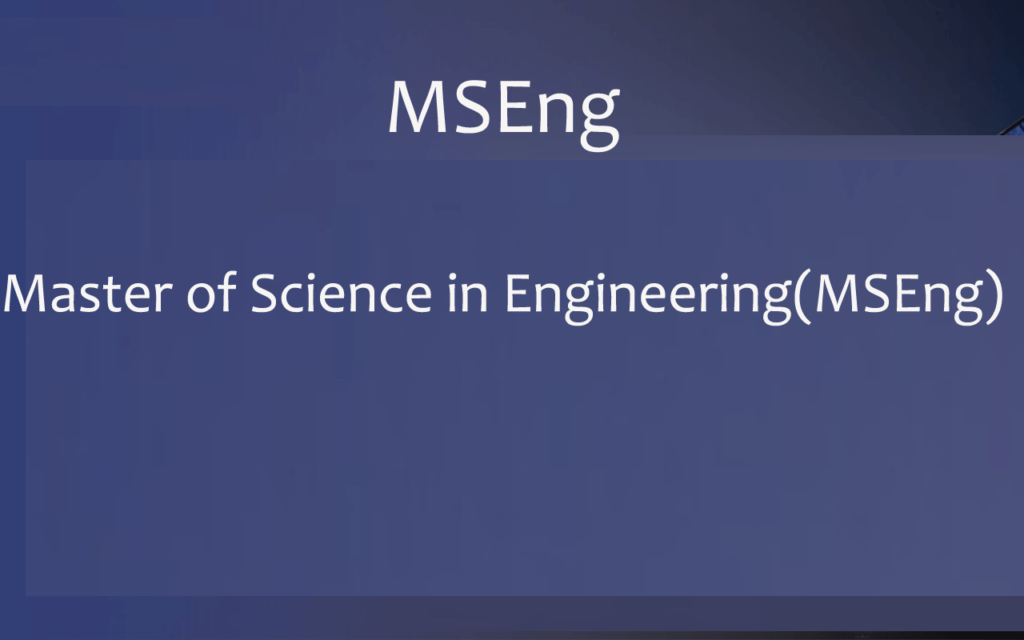
A Master of Science in Engineering (MSENG) is a graduate degree that typically takes two to three years to complete. It focuses on the application of scientific and engineering principles to solve problems. Depending on the specific program, students may be required to choose a concentration in a particular area of engineering such as mechanical, electrical, civil, or chemical engineering. Coursework may include engineering principles and concepts, research methods, computer programming, and mathematics. Some programs may require students to complete a thesis or participate in an engineering project as part of the curriculum.
Master of Science in Engineering (MSENG) Eligibility Criteria
The general eligibility criteria for pursuing a Master of Science in Engineering (MSENG) degree are as follows:
• A Bachelor‘s degree in engineering, mathematics, science, or a related field from an accredited college or university.
• A minimum undergraduate GPA of 3.0 or higher.
• A satisfactory score on the Graduate Record Examination (GRE) or a comparable entrance examination.
• Letters of recommendation from professors or employers.
• A statement of purpose.
• Official transcripts from all previous post–secondary institutions attended.
• English language proficiency (for international students).
Master of Science in Engineering (MSENG) Colleges In India
1. Indian Institute of Technology Bombay
2. Indian Institute of Technology Delhi
3. Indian Institute of Technology Madras
4. Indian Institute of Technology Kanpur
5. Indian Institute of Technology Kharagpur
6. Indian Institute of Technology Guwahati
7. Indian Institute of Technology Roorkee
8. National Institute of Technology Tiruchirappalli
9. National Institute of Technology Karnataka
10. Delhi Technological University
11. National Institute of Technology Warangal
12. National Institute of Technology Calicut
13. National Institute of Technology Rourkela
14. Visvesvaraya National Institute of Technology
15. Birla Institute of Technology and Science
16. Indian Institute of Engineering Science and Technology, Shibpur
17. PEC University of Technology, Chandigarh
18. SVKM‘s NMIMS University, Mumbai
19. Thapar Institute of Engineering and Technology, Patiala
20. BMS College of Engineering, Bangalore
Master of Science in Engineering (MSENG) List of Stream
1. Aerospace Engineering
2. Biological Engineering
3. Chemical Engineering
4. Civil Engineering
5. Computer Engineering
6. Electrical Engineering
7. Environmental Engineering
8. Mechanical Engineering
9. Mechatronics Engineering
10. Systems Engineering
Master of Science in Engineering (MSENG) Syllabus
I. Mathematics
A. Calculus
1. Limits, Continuity, and Differentiation
2. Integration
3. Series
4. Multivariable Calculus
B. Linear Algebra
1. Matrices
2. Systems of Linear Equations
3. Vector Spaces
4. Eigenvalues and Eigenvectors
C. Probability and Statistics
1. Probability Theory
2. Estimation
3. Hypothesis Testing
4. Regression Analysis
II. Engineering Sciences
A. Mechanics
1. Statics
2. Dynamics
3. Strength of Materials
4. Fluid Mechanics
B. Electrical Engineering
1. Circuits
2. Electronics
3. Control Systems
4. Signal Processing
C. Computer Science
1. Algorithms
2. Data Structures
3. Programming Languages
4. Operating Systems
III. Engineering Design
A. Design Process
1. Problem Definition
2. System Requirements
3. Design Alternatives
4. Prototype Evaluation
B. Design Tools
1. Computer–Aided Design (CAD)
2. Finite Element Analysis (FEA)
3. Computer–Aided Manufacturing (CAM)
4. Computer–Aided Engineering (CAE)
IV. Professional Practice A.
Project Management
1. Project Planning
2. Project Scheduling
3. Resource Allocation
4. Risk Management
B. Professional Communication
1. Technical Writing
2. Oral Presentation
3. Negotiation and Conflict Resolution
4. Ethics and Professionalism






